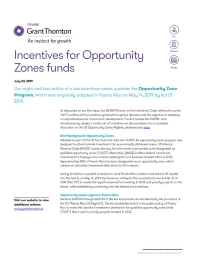This is our eighth and last article of a tax incentives series updates the Opportunity Zone Program.
The program was originally adopted in Puerto Rico on May 14, 2019 by Act 21-2019.
As discussed on our first issue, Act 60-2019 (known as the Incentives Code, referred to as the “Act”) codifies all the incentives granted throughout decades with the objective of adopting a comprehensive tool of economic development. The Act revokes Act 21-2019, and simultaneously adopts a similar set of incentives we discuss below.
Access the complete discussion on the US Opportunity Zones Regime.
Brief background: Opportunity Zones
Adopted as part of the US Tax Cuts and Jobs Act of 2017, the opportunity zones program was designed to attract private investment into economically distressed areas. US Internal Revenue Code §1400Z-1 paves the way for low-income communities to be designated as qualified opportunity zones (“QOZ”). Meanwhile, §1400Z-2 offers federal income tax incentives to a taxpayer who invests capital gains in a business located within a QOZ. Approximately 98% of Puerto Rico has been designated as an opportunity zone, which creates an attractive investment alternative for US investors.
Aiming to fashion a parallel incentive for local Puerto Rico investors and attract US capital into the Island, on May 14, 2019 the Governor of Puerto Rico enacted into law Act No. 21 of 2019 (“Act 21”) to create the legal framework for investing in QOZ and priority projects on the Island, while establishing conformity with the federal tax incentives.
Opportunity zones regime in Puerto Rico
Sections 6070.54 through 6070.69 of the Act incorporate almost identically the provisions of Act 21 (“Puerto Rico OZ Regime”). The Act establishes that it is the public policy of Puerto Rico to make the island an investment destination for qualified opportunity zone funds (“QOF”) that invest in priority projects located in QOZ.
The Puerto Rico Oportunity Zones Regime intends to:
- Amend §1031.06 of the Puerto Rico Internal Revenue Code to adopt a section parallel to US IRC Section 1400Z-2, regarding the special rules for capital gains invested in QOF to allow for capital gains subject to Puerto Rico income tax to be subject to said preferential tax treatment; and
- Create a new incentives regime for priority projects located in opportunity zones (“Priority Projects”).
The Act adopts the QOZ Priority Project Committee originally adopted by Act 21, composed of 7 members: the Government’s Chief Financial Officer and Chief Investment Officer, the Executive Directors of the Puerto Rico Fiscal Agency and Financial Advisory Authority and Puerto Rico Public- Private Partnerships Authority, the Department of Economic Development Commerce of Puerto Rico (DDEC) Secretary and two members chosen by the Legislative Branch (one by the Senate and one by the House).
The QOZ Priority Project Committee shall publish a list of Priority Projects on or before July 31, 2019. Projects that are on the list will be eligible to apply for a grant of tax exemption under an ordinary process. If a proposed project is not on the list, the proponent shall request the designation of the project as a Priority Project from the Committee before filing an application for a tax exemption grant.
An “eligible business” is a business that meets the following requirements:
- the business activity is performed in its entirety in an eligible zone;
- the business activity performed is not eligible for tax exemption benefits under Acts 20-2012, 73-2008, 74-2010, 83-2010, or 27-2011 or any successor or analogous law;
- the business activity is performed by a qualified opportunity fund or an entity that invests in QOZ property; and
- Act 60 eliminated a requirement that 50% or more of the capital contributed to the QOF in exchange for stock or partnership interest, results from investments for which the investors made a gain deferral election under the US Code or §1031.06 of the Puerto Rico Code.
- the business activity performed is a Priority Project in a QOZ.
A “Priority Project” is defined as a trade or business or other activity for the production of income that will contribute to the social and economic diversification, recovery or transformation of the community in the eligible zone.
The incentives applicable to an eligible business should be requested through a grant of tax exemption with the Secretary of the DEDC and include the following:
- 18.5% flat income tax rate on income derived from eligible activities by an eligible business;
- 100% tax exemption on dividend distributions;
- 5% withholding at source on rents, royalties and license fees paid to entities not engaged in trade or business in Puerto Rico or nonresident individuals;
- 25% exemption on municipal license tax (Municipality may provide an exemption up to 75% through municipal ordinance);
- 25% exemption on personal and real property tax (Municipality may provide an exemption up to 75% through municipal ordinance);
- 25% exemption on municipal construction excise tax (Municipality may provide an exemption up to 75% through municipal ordinance);
- guaranteed 5% transferrable investment tax credit, which may be increased to 25%;
- 100% exemption from tax for interest income received on bonds, promissory notes or other obligations of an eligible business for the development, construction or rehabilitation of, or improvements to an eligible business; and
- 15 years exemption period; flexible tax exemption is allowed.
Note that businesses in the export services, manufacturing, tourism, energy and film sectors are not precluded from benefitting from the special treatment of capital gains invested in QOF. Rather, they will not be able to benefit from item number 2 of the Puerto Rico OZ Regime regarding Priority Projects (i.e. not eligible for the investment credit), provided that those businesses may seek to obtain a grant to cover their activities under the corresponding chapter of the Incentives Code according to the nature of such trade or business (i.e. export, manufacturing, etc.)..
There should be a pending technical amendment in connection to item number 1 of the Puerto Rico OZ Regime discussed above. Act 60 did not adopt the entirety of §1031.06 of the Puerto Rico Code. Therefore, the revocation of Act 21 and simultaneous technical amendment to §1031.06 of the Puerto Rico Code within Act 60 creates an uncertain scenario for QOZ investors that should be clarified.
The Act is mainly effective from July 1, 2019. Changes incorporated by the Act will not affect current grantee holders. Applicants may elect to file under previous laws or under the Act until December 31, 2019. Commencing on January 1, 2020, all applications will have to be submitted under the Act. However, the Secretary of the DEDC may implement by regulation provisions of the Act before January 1, 2020 to further the objectives of the Act.
We expect further guidance from the Secretary of the DEDC and related agencies in connection to the specific incentives and processes to be followed.


